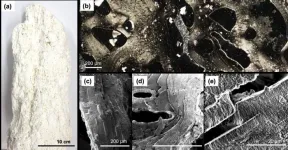(Press-News.org) An “invisible forest” of phytoplankton is thriving in part of our warming ocean, new research shows.
Phytoplankton are tiny drifting organisms that do about half of the planet’s “primary production” (forming living cells by photosynthesis).
The new study, by the University of Exeter, examined phytoplankton at the ocean surface and the “subsurface” – a distinct layer of water beneath – to see how climate variability is affecting them.
Published in the journal Nature Climate Change, the findings show these two communities are reacting differently.
Over the last decade, the total “biomass” (living material) of subsurface phytoplankton has increased in response to warming.
Meanwhile, surface phytoplankton now has less chlorophyll – making it less green – but in fact total biomass has remained stable.
Based on 33 years of data from the Bermuda Atlantic Time-series Study (BATS) in the Sargasso Sea, the findings also suggest the depth of the “surface mixed-layer” (region of turbulence at the surface of the ocean) has shallowed as the ocean rapidly warmed in the last decade.
“It’s important to understand these trends because phytoplankton are the foundation of the marine food web, and play a key role in removing carbon dioxide from the atmosphere,” said Dr Johannes Viljoen, from the Department of Earth and Environmental Science at Exeter’s Penryn Campus in Cornwall.
“Our findings reveal that deep-living phytoplankton, which thrive in low-light conditions, respond differently to ocean warming and climate variability compared to surface phytoplankton.
“We typically rely on satellite observations to monitor phytoplankton, but the subsurface is hidden from satellite view.
“Our study highlights the limitations of satellite observations, and underscores the urgent need for improved global monitoring of phytoplankton below what satellites can see.”
Co-author Dr Bob Brewin added: “Changes at the base of the food web can have cascading effects on marine life, from tiny zooplankton to large fish and marine mammals.
“So the future of phytoplankton will have major implications for biodiversity, as well as climate change.”
Dr Viljoen added: “Continued monitoring of these deep-living phytoplankton will help scientists better understand ongoing changes in the ocean that might otherwise go unnoticed.”
The research of Dr Viljoen and co-authors Dr Brewin and Dr Xuerong Sun, all from the Centre for Geography and Environmental Science, is supported by a UKRI Future Leader Fellowship awarded to Dr Brewin.
The paper is entitled: “Climate variability shifts the vertical structure of phytoplankton in the Sargasso Sea.”
END
‘Invisible forest’ of algae thrives as ocean warms
2024-09-25
ELSE PRESS RELEASES FROM THIS DATE:
How do rare genetic variants affect health? AI provides more accurate predictions
2024-09-25
Whether we are predisposed to particular diseases depends to a large extent on the countless variants in our genome. However, particularly in the case of genetic variants that only rarely occur in the population, the influence on the presentation of certain pathological traits has so far been difficult to determine. Researchers from the German Cancer Research Center (DKFZ), the European Molecular Biology Laboratory (EMBL) and the Technical University of Munich have introduced an algorithm based on deep learning that can predict the effects of rare genetic variants. The method allows persons with high risk of disease to be distinguished more precisely and facilitates the identification ...
Replacing hype about artificial intelligence with accurate measurements of success
2024-09-25
The hype surrounding machine learning, a form of artificial intelligence, can make it seem like it is only a matter of time before such techniques are used to solve all scientific problems. While impressive claims are often made, those claims do not always hold up under scrutiny. Machine learning may be useful for solving some problems but falls short for others.
In a new paper in Nature Machine Intelligence, researchers at the U.S. Department of Energy’s Princeton Plasma Physics Laboratory (PPPL) and Princeton University performed a systematic review of research comparing machine learning to traditional methods for solving ...
Researchers harness AI to repurpose existing drugs for treatment of rare diseases
2024-09-25
There are more than 7,000 rare and undiagnosed diseases globally.
Although each condition occurs in a small number of individuals, collectively these diseases exert a staggering human and economic toll because they affect some 300 million people worldwide.
Yet, with a mere 5 to 7 percent of these conditions having an FDA-approved drug, they remain largely untreated or undertreated.
Developing new medicines represents a daunting challenge, but a new artificial intelligence tool can propel the discovery of new therapies from existing medicines, offering hope for patients with rare and neglected conditions and for the clinicians who treat them.
The AI model, called TxGNN, is the first one ...
Combination treatment improves response to immunotherapy for lung cancer
2024-09-25
Francis Crick Institute press release
Under strict embargo: 10:00hrs BST Wednesday 25 September 2024
Peer reviewed
Experimental study
Animals
Combination treatment improves response to immunotherapy for lung cancer
Researchers at the Francis Crick Institute, in collaboration with Revolution Medicines, have tested a combination of treatments in mice with lung cancer and shown that these allow immunotherapies to target non-responsive tumours.
Their findings show that targeting tumours in ...
Nanostructures in the deep ocean floor hint at life’s origin
2024-09-25
Researchers led by Ryuhei Nakamura at the RIKEN Center for Sustainable Resource Science (CSRS) in Japan and The Earth-Life Science Institute (ELSI) of Tokyo Institute of Technology have discovered inorganic nanostructures surrounding deep-ocean hydrothermal vents that are strikingly similar to molecules that make life as we know it possible. These nanostructures are self-organized and act as selective ion channels, which create energy that can be harnessed in the form of electricity. Published Sep. 25 in Nature Communications, the findings impact not only our understanding of how life began, but can also ...
Humbug damselfish use 'motion dazzle' to evade predators
2024-09-25
When thinking of animal camouflage, we typically imagine creatures remaining still, blending seamlessly into their surroundings. But remaining motionless isn’t always practical, and many animals are highly mobile, constantly moving through their environment to graze their food.
New research suggests that high-contrast patterns on animals’ bodies may serve a dual purpose: offering camouflage when stationary, then creating a ‘motion dazzle’ effect when moving, confusing potential predators into misjudging their location – and helping them avoid being ...
Can a drug-free nasal spray protect against deadly respiratory infections?
2024-09-25
New research published in Advanced Materials reports a novel nasal spray for preventing respiratory infections. The spray works by forming a protective coating on the nasal cavity, which captures airborne respiratory droplets and acts as a physical barrier against viruses and bacteria, while effectively neutralizing them.
In studies conducted on mice, the Pathogen Capture and Neutralizing Spray (PCANS) demonstrated up to 8 hours of nasal retention. In a severe Influenza A model, a single pre-exposure dose of PCANS resulted in a greater than 99.99% reduction ...
Do natural disasters jeopardize women’s reproductive health?
2024-09-25
In research published in Brain and Behavior, investigators found increased rates of menstrual irregularities in women living in areas affected by the 2023 earthquake in Turkey.
In the study, 309 women of reproductive age living in regions declared as disaster areas completed online forms 9 months after the earthquake. Responses revealed an increase of menstrual irregularities from 14.3% before the earthquake to 44.8% after the earthquake. Risk factors for menstrual irregularities included post-traumatic stress symptoms, chronic diseases, and smoking.
The findings reveal that reproductive health ...
Can cosmic radiation in outer space affect astronauts’ long-term cognition?
2024-09-25
During missions into outer space, galactic cosmic radiation (GCR) will penetrate current spacecraft shielding and thus pose a significant risk to human health. Previous studies have shown that GCR can cause short-term cognitive deficits in male rodents. Now a study published in the Journal of Neurochemistry reveals that GCR exposure can also cause long-lasting learning deficits in female rodents.
The impact of GCR on cognition was lessened when mice were fed an antioxidant and anti-inflammatory compound called CDDO-EA.
Beyond ...
Do preventive health technologies promote or harm consumers’ wellbeing?
2024-09-25
Preventive health technologies—such as wrist-worn activity trackers or health and fitness apps—are popular tools for promoting wellbeing, but new research published in the Journal of Consumer Affairs reveals that consumer engagement with these technologies can be considered a double-edged sword.
The study, which involved 30 in-depth interviews with users, found that consumers engage with preventive health technologies based on a variety of health goals—for example, to lose weight, improve performance, monitor data of an enjoyable activity, or acquire a healthy routine.
These diverse goals led users ...



